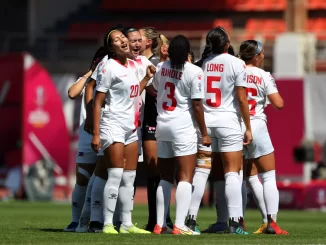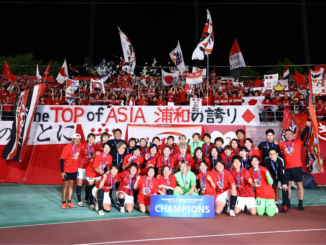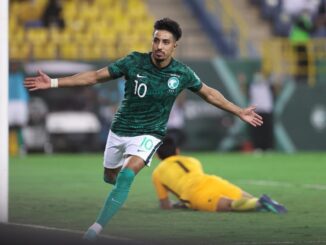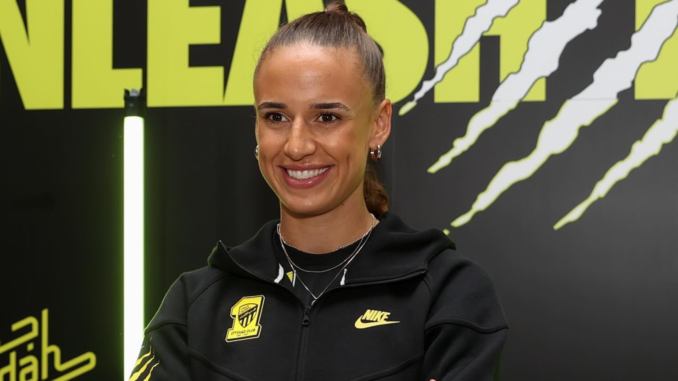
Ashleigh Plumptre had just arrived back home in Leicester from a holiday in the USA, visiting family and friends in Los Angeles, where she had previously studied at the University of Southern California, and enjoying some down time at the end of a busy Women’s Super League season with her hometown club, Leicester City.
It was her father Tim’s birthday, so to celebrate the family ordered take out Indian from Spice Bazaar, their favourite local restaurant, which is only a mile away from Leicester’s King Power Stadium; the place she had called home for the previous four seasons.
As she always did, she ordered the Chicken Korma. Comforting and homely. Or ‘boring’, as she described her culinary choice; the complete opposite of what she was about to embark on.
Weary and even a little jet-lagged, she sat in the passenger seat as her and her father, who also doubles as her agent, drove to collect dinner. On the way she took a call that not only challenged her, but would change her life.
It was a call she probably never thought she would make to a club she probably never thought she would speak with. Why would she after four years with Leicester City, helping them earn promotion to the WSL.
Out of contract, she had offers from all over the world, but it was this one particular offer that floored her.
In fact, when the offer first arrived, she told The Asian Game, she burst into tears. And not tears of joy, but tears of fear. Tears of bemusement.
‘Why do they want me?’ she wondered.
They were Al Ittihad, a giant in the sphere of men’s football in Saudi Arabia, but still a fledgling club in the nascent Saudi Women’s Premier League.
“I’ll be honest, straight away I had alarm bells going off in my head based on the preconceptions I had of the country, based on what I’d heard and read and seen,” Plumptre told The Asian Game from Doha, where she was recovering after recent foot surgery.
“I have never said this, but when my Dad brought it up, I actually cried. But not out of happiness. It was overwhelming to me. This might be my naivety, but why is somebody in Saudi Arabia interested in me? Do they want to know about me? Do they want to just bring me to make it look good? So, it made me upset, because I am an overthinker.”
Ashleigh, 26, had grown up, despite her Nigerian heritage, in what she describes as a very British upbringing. One, she admits, that provided her with a very shallow world view, shaped by the media narrative rather than her own experiences.
“I was very narrow minded,” she admitted.
So, when a club from Saudi Arabia came calling, her initial reaction was one of fear.
But at her father’s behest, she took the call, with coach Kelly Lindsey, a journeyed American who previously worked with the Afghan women’s national team, and team managers, Haya Al-Jamal and Abdulaziz Al-Gosaibi.
By the end of the drive, and the almost hour-long phone call, she was an Al Ittihad player. At least in her mind, if not yet officially. That would come a few weeks later after a three-day visit to Jeddah to meet the club and see things for herself.
But she told her father, as they returned to the family home, Chicken Korma in hand, this is where she needed to be.
“Most of the time we didn’t even speak about football,” she said of the call with Al Ittihad.
“It was like, what do we care about as people? What’s the impact that we want to have? And I came off that call, and I was like: ‘I think this is where I want to be.’ Because I’m a big believer in connecting with people on a real human level. I’m huge on it. And I just felt this energy from my coach, and I was like: ‘OK, I think this is it.’”
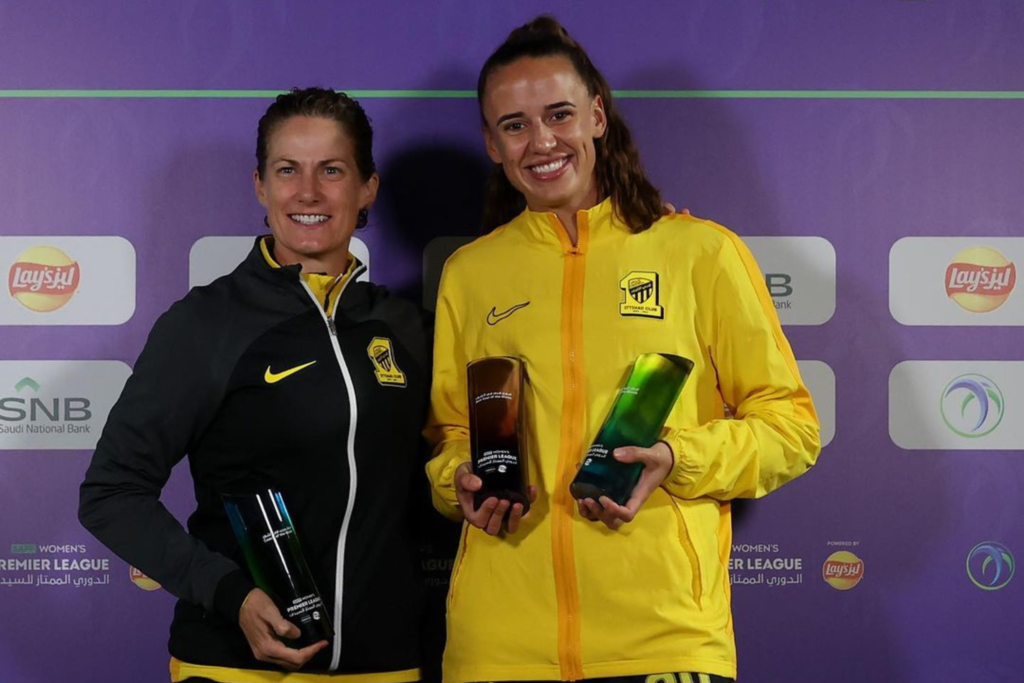
That was in June, long before she appeared at the FIFA Women’s World Cup for Nigeria. Somehow it managed to stay secret until it was announced in mid-September, almost three months later.
When it became public, she was flooded with criticism, by those who claimed she had ‘sold out’ for a bigger paycheck. While the criticism hurt, she knew in herself she was making the right move for her.
“It was hard,” she admitted.
“Some things I decided to read because I wanted to know how people felt. But that was also hard for me as well, because I did internalise it.
“But I always say, take the distractions away. What do you feel, Ash? That’s what I asked myself. I was just like, I have all this criticism, but I know myself, and I know the reason that I’m going.
“I said to my Dad, even if I was on the biggest wage ever, but there was no part of it that aligned with me, I couldn’t go. Because then I’m talking to you and I’m preaching about something I’m not living.”
The move to Al Ittihad was a step into the unknown. New country. New culture. New teammates and a new style of football.
Coming on the back of an impressive Women’s World Cup performance for Nigeria, it was a big career move at the peak of her powers.
So, 12 months on from that fateful phone call, how does she reflect on the experience?
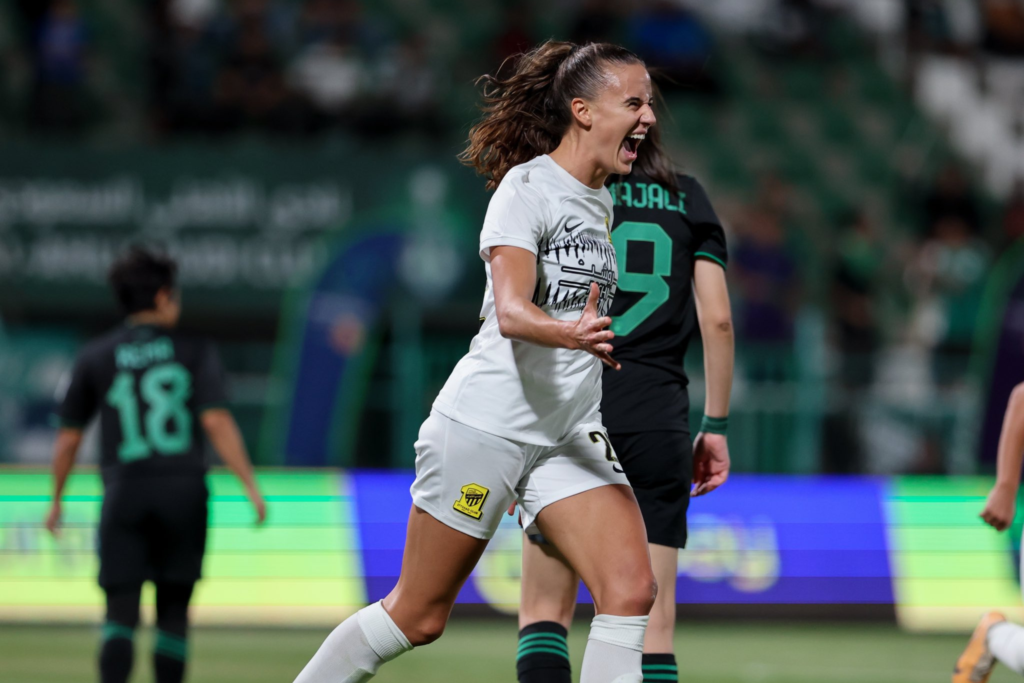
“Good question,” she says, as she pauses to reflect.
She sits in silence for 12 long seconds, moments and memories flicking through her brain. She could’ve said the first cliched thing that came into her mind, but that isn’t Ashleigh.
As she admitted, she is a self-described overthinker. Ask a question, and you’ll get a real, raw and honest answer. It’s what makes speaking with her such a fulfilling experience. She pours her thoughts and emotions out. You feel like you’re connecting on a deeper level than is normally the case when interviewing a footballer.
In those 12 seconds, she says nothing, but her silence says a lot. It gives a window into who she is: thoughtful, engaging and stunningly honest.
When she finds the answer, again it is deeper than just the football. It’s about human connection.
“I’m sorry, it’s not always a short answer,” she forewarns of her near seven-minute response.
“I didn’t know what I was going into, but there’s a couple of people that joined the team who I really aligned with (and) their reason for coming,” she said, referring to fellow Briton, Leighanne Robe, who joined after five years at Liverpool.
“I knew of her (and) played against her, but we’d never spoken before. And our personalities are different, granted, they’re very different, but when we’ve had our conversations on our purpose, it’s the same thing.
“One thing I can say is I’ve never been on a team of people with so many different personalities. I was able to have some conversations with people quite deeply, and I’ve always said I will never share some of those conversations I’ve had with people because of the trust that we formed from knowing one another.
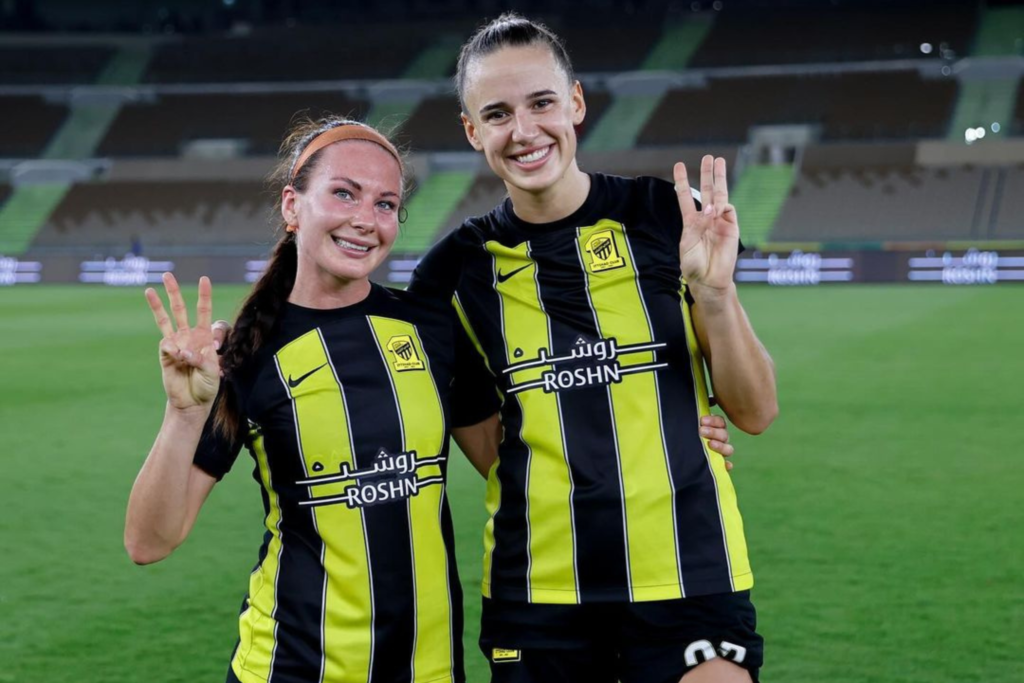
“But there are also some times with some of my teammates that I couldn’t have that with them, or maybe they didn’t like my approach, or whatever. And I’ve experienced all of that within one year, and I’m talking about, aside from football. We haven’t even got to the actual playing part yet.
“But I just think the experience I’ve been able to go through, the tough and rewarding conversations and encounters (I’ve had) has ultimately helped me grow and learn and become more open.”
As we finally get around to talking about the football, she says the lower standard of the SWPL compared to the WSL was, in some respects, actually a blessing.
“A lot of people have said you’re not going to be challenged as much. And I get that, but the one thing that I’ve experienced is I’ve seen myself do things I didn’t know I could do.
“Because I think sometimes in the WSL, you have a particular role, and that is your role. Whereas in Saudi, because it’s still progressing, even from a formation or tactical point of view, sometimes that can kind of be thrown out the window.
“I’ll be honest that there were times when I was able to get up the pitch, and sometimes that would not be helpful, because it would leave us vulnerable at the back. But I had more freedom to be like, if you want to shoot from that far, do it. And no, I don’t do that all the time.
“But again, it’s just this feeling where people say, if you play with freedom, you’re expressing yourself. I think this is why I’m desperate to not be injured, because I want to see where I can get to now. Because I played last season struggling, and I managed to do things that I didn’t believe I could do.
“And that’s what excites me. It’s just the potential I’ve managed to recognise in myself that I probably didn’t see before, because I’ve always been a player that lacks a lot of confidence. It’s opened another door for me thinking, well, what else can I do?”
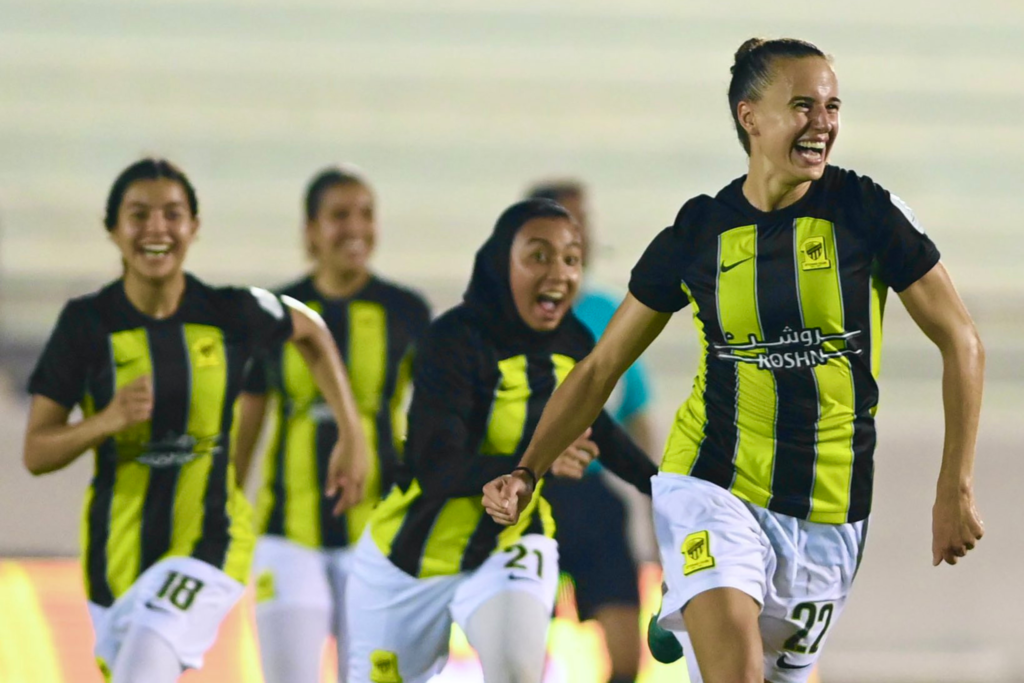
It’s something she will hope to answer this coming season. Despite Lindsey departing at the end of the season, with Al Ittihad finishing a lowly sixth, Ashleigh is chomping at the bit to return for a season free of the pain that has crippled her for the past few years.
As she returns to the Kingdom from three months at Doha’s Aspetar Hospital at the famed Aspire Academy, another season in Jeddah means the prospect of more Plumptre sister time in the Kingdom.
Ashleigh is the eldest of four siblings, with one younger sister (14) and two younger brothers (14 and 15). While she is close with all three of her younger siblings, she has a special relationship with her sister, Bayleigh.
With a 12-year age gap between the two sisters, it meant when Ashleigh went to College in America, she missed a large chunk of her Bayleigh’s childhood.
It’s time she is determined to get back.
“Unfortunately, I haven’t been able to do this so much with my brothers yet, but the aim is for them to be able to come and visit me,” she said.
“But my sister, whether it’s been Saudi Arabia or here in Qatar, while I’m rehabbing, she’s been able to come out here and experience the culture, the lifestyle, and just see what my life is like.
“She’s 14, my brothers are 14 and 15, so I just think in that respect, even though I’ve had to miss out on them growing up, the fact that I can give them the opportunity, my sister more so, to come out and experience this, is something that I really value, and I know my sister does. To the point where she would rather be at school out here than at home, like she gets so upset when she leaves because she loves it out here.”
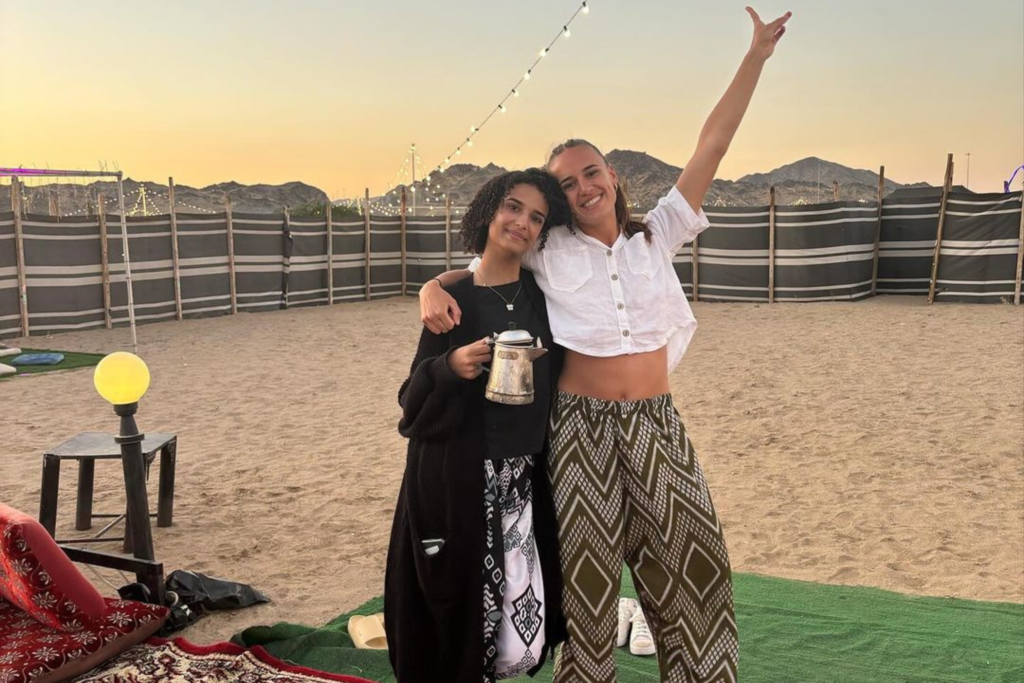
Despite being 12 years her sister’s senior, Ashleigh says she takes on the role of learning from her sister.
“At a young age, to come out and experience things for themselves, take them out of their comfort zone, but also experience something that makes them uncomfortable, like they’re in a completely different environment that they’re not used to.
“But my sister has a very open mind and is curious, like that girl, she’s 14, (but) I always say I learn more from kids than I do adults in general, and especially with my sister. Because they have an imagination, they have a curious mind, and they haven’t been, almost like tainted by society yet. So that curiosity… I learn a lot from my sister.
“I just think all of that, it all adds up into giving her an opinion based on what she’s able to experience. And I know it’s based on her experience, and it’s not the same for everybody, but I want her to be in a position where she can see everything, experience everything, and make up her own mind on what she feels places are like.”
It’s a long way, literally and figuratively, from where Ashleigh was 12 months prior when the mere prospect of an offer from Saudi Arabia filled her with fear and dread.
That speaks to the journey of self-discovery she has embarked on. Not even she knows where that will take her. She couldn’t have envisaged it would take her to Saudi Arabia, of all places. But it did, and her life and her outlook on it, has changed as a result.
Many a life has been changed over a hearty Chicken Korma. It’s one meal Ashleigh is never likely to forget.
Listen to Episode 228 of The Asian Game Podcast as we go In Conversation With… Ashleigh Plumptre


